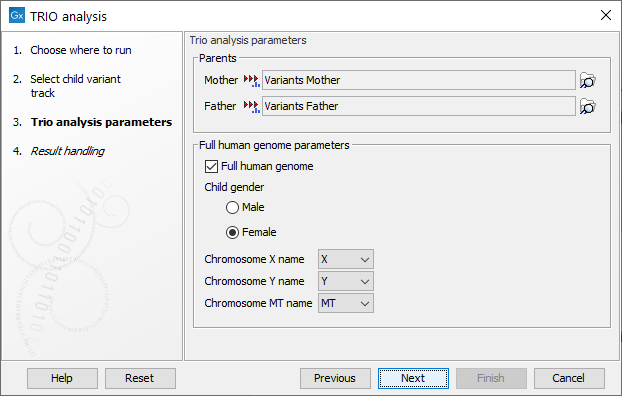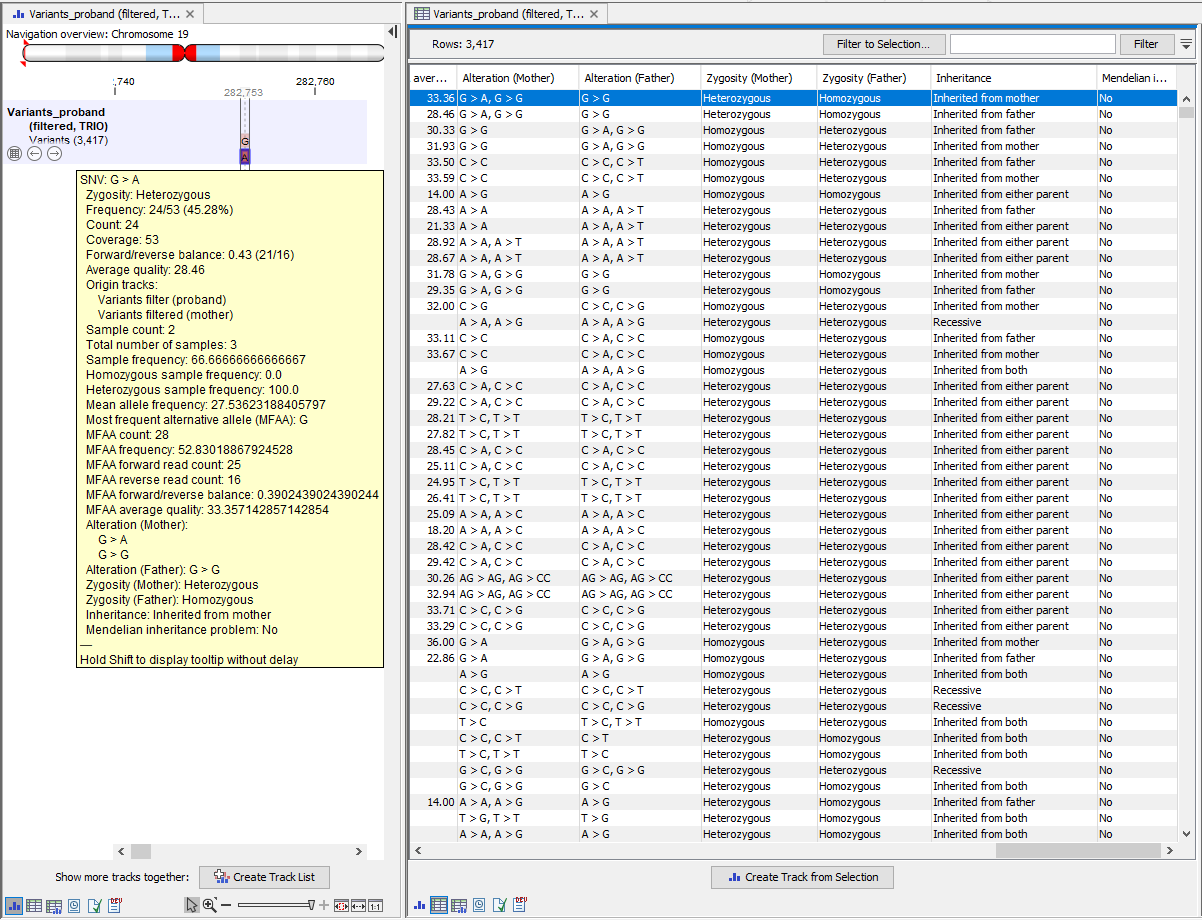Trio Analysis
This tool should be used if you have a trio study with one child and its parents. It should be mainly used for investigating differences in the child in comparison to its parents.
To start the Trio analysis:
Tools | Resequencing Analysis (![]() ) | Variant Comparison (
) | Variant Comparison (![]() ) | Trio Analysis (
) | Trio Analysis (![]() )
)
In the first step of the dialog, select the variant track of the child. Clicking Next shows the dialog in figure 32.10.

Figure 32.10: Selecting variant tracks of the parents.
Click on the folder (![]() ) to select the two variant tracks for the
mother and the father. In case you have a human TRIO, please specify if the
child is male or female and how the X, Y chromosomes as well as the mitochondrion
are named in the genome track. These parameters are important in order to apply specific
inheritance rules to these chromosomes.
) to select the two variant tracks for the
mother and the father. In case you have a human TRIO, please specify if the
child is male or female and how the X, Y chromosomes as well as the mitochondrion
are named in the genome track. These parameters are important in order to apply specific
inheritance rules to these chromosomes.
Click Next and Finish.
The output is a variant track showing all variants detected in the child. For each variant in the child, it is reported whether the variant is inherited from the father, mother, both, either or is a de novo mutation. This information can be found in the tooltip for each variant or by switching to the table view (see the column labeled "Inheritance") (figure 32.11).

Figure 32.11: Output from Trio Analysis showing the variants found in the child in track and table format.
In cases where both parents are heterozygous with respect to a variant allele, and the child has the same phenotype as the parents, it is unclear which allele was inherited from which parent. Such mutations are described as 'Inherited from either parent'.
In cases where both parents are homozygous with respect to a variant allele, and the child has the same phenotype as the parents, it is also unclear which allele was inherited from which parent. Such mutations are described as 'Inherited from both'.
In cases where both parents are heterozygous and the child homozygous for the variant, the child has inherited a variant from both parents. In such cases the tool will also check for a potential recessive mutation. Recessive mutations are present in a heterozygous state in each of the parents, but are homozygous in the child. To investigate potential disease relevant variants, recessive variants and de novo variants are the most interesting (in case the parents are not affected). The tool will also add information about the genotype (homozygote or heterozygote) in all samples.
If child or parent variants have a zygosity that is inconsistent with the number of alleles (e.g. heterozygous but one allele), then the mutation is described with 'Inconsistent zygosity'. Similarly, if the zygosity of child or parent variants are unknown, then the mutation will be described with 'Unknown zygosity'.
For humans, special rules apply for chromosome X (in male children) and chromosome Y, as well as the mitochondrion, as these are haploid and always inherited from the same parent. Heterozygous variants in the child that do not follow mendelian inheritance patterns will be marked in the result.
Her is an example where the trio analysis is performed with a boy:
The boy has a position on the Y chromosome that is heterozygous for C/T. The heterozygous C is not present in neither the mother or father, but the T is present in the father. In this case the inheritance result for the T variant will be: 'Inherited from the father', and for the C variant 'de novo'. However, both variants will also be marked with 'Yes' in the column 'Mendelian inheritance problem' because of this aberrant situation. In case the child is female, all variants on the Y chromosome will be marked in the same way.
The following annotations will be added to the resulting child track:
- Zygosity. Zygosity in the child as reported from the variant detection tool. Can be either homozygote or heterozygote.
- Zygosity (Name of parent track 1). Zygosity in the corresponding parent (e.g. father) as reported from the variant detection tool. Can be either homozygote or heterozygote.
- Allele variant (Name of parent track 1). Alleles called in the corresponding parent (e.g. father).
- Zygosity (Name of parent track 2). Zygosity in the corresponding parent (e.g. mother) as reported from the variant detection tool. Can be either homozygote or heterozygote.
- Allele variant (Name of parent track 2). Alleles called in the corresponding parent (e.g. mother).
- Inheritance. Inheritance status. Can be one of the following values, or a combination of these: 'De novo', 'Recessive', 'Inherited from both', 'Inherited from either', 'Inherited from (Name of parent track)', 'Inconsistent zygosity', 'Unknown zygosity'. For example, a proband homozygous for a variant that only one parent (the mother in this case) presents will result in an inheritance described as "De novo, inherited from mother".
- Mendelian inheritance problem. Variants not following the mendelian inheritance pattern are marked here with 'Yes'.
Note! If the variant at this position cannot be found in either of the parents, the zygosity status of the parent where the variant has not been found is unknown, and the allele variant column will be left empty.
